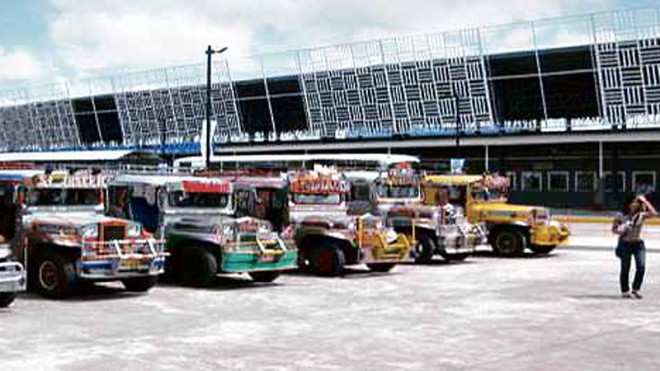Ex-rebels’ project leads Galing Pook awardees

INTEGRATED land transport terminal project in Legazpi City, one of the Galing Pook awardees, seeks to reduce traffic congestion in the capital of Albay province. CONTRIBUTED PHOTO
MANILA, Philippines–A revolution of the governance-changing kind is sweeping a number of local government units (LGUs) in the Philippines.
In Lanao del Norte province, the municipality of Kauswagan that has long suffered from death and destruction due to armed clashes between the Blackshirts (Maranao rebels) and the Ilagas (Christian forces) is transforming into a thriving organic farming community.
Through the From Arms to Farms program implemented by the municipality, former rebel fighters were brought into the fold to participate in socioeconomic activities, mainly organic farming, in Kauswagan, where poverty incidence was pegged at a high of 79 percent in 2009.
So far, nine commanders of the Moro Islamic Liberation Front and more than 100 of their men have laid down their arms and embraced their new roles as farmer-entrepreneurs, enticed by the firm commitment of the local government to involve the entire community in identifying and implementing projects relevant to the needs of the communities and potential rebel returnees.
Within two years from the change in local leadership in 2010 and through constant involvement of the community in program identification and implementation, the former rebels were able to set aside their distrust and skepticism and became busy with planting crops, raising livestock and managing fishponds with the help of initial capital assistance provided by the LGU under a cost-recovery plan.
Article continues after this advertisementThe increase in the number of farmers in Kauswagan helped reduce the town’s poverty incidence from 79 percent in 2009 to 47.5 percent in 2013.
Article continues after this advertisementPeace has returned to Kauswagan, which is now visited often by officials from other cities and municipalities who want to know more about how to effectively bridge the gap between Christians and Muslims and to promote peace and development.
In Tagum City, Davao Del Norte province, trash-filled and crime-ridden streets now host 317 vendors and small-scale entrepreneurs who are earning more than ever because of a bustling and organized night market.
Residents of Quezon province, meanwhile, are enjoying an increased harvest of crabs, fish and shellfish because of a massive mangrove replanting program that has restored the homes of various species of fish, crustaceans and mollusks, and improved the lives of coastal communities.
These innovative programs implemented jointly by LGUs, residents and partners in the government, the private sector and civil society are among the 10 local government programs deemed worthy to receive this year’s Galing Pook Awards, which recognize the best examples of good governance at work in the Philippines.
Rigorous screening
The awards are given by Galing Pook Foundation, which was established in 1993 following the passage of the Local Government Code in 1991 to champion innovation and excellence in local governance and to recognize innovative and trailblazing programs that can serve as benchmarks and inspiration for other LGUs.
The awardees are chosen from a national search of local governance programs, which are evaluated through a rigorous screening process according to positive results and impact, promotion of people’s participation and empowerment, sustainability and efficiency of service delivery.
President Aquino will formally recognize this year’s Galing Pook awardees in Malacañang on Oct. 21.
Galing Pook Foundation chair Ma. Lourdes C. Fernando, former mayor of Marikina City, said in a statement that this year’s good governance examples were “surprising in their simplicity” and could be readily replicated in other barangays (villages), municipalities, cities and provinces.
On the list of this year’s awardees are the health delivery program of the provincial government of Quezon that covers the remotest barangays and Quezon City’s socialized housing project for the urban poor and Klinika Bernardo, which provides HIV/AIDS (human immunodeficiency virus/acquired immune deficiency syndrome) patients with health services in a stigma-free and nondiscriminatory environment.
Eye care
The provincial government of Tarlac likewise delivered an award-winning program, the Linaw Tingin project, that provides quality eye-care services with a special focus on the marginalized and poor communities, while Legazpi City in Albay province boasts of its integrated land transport terminal that has reduced traffic congestion and chaos in the city, where about 350,000 students, businessmen and tourists converge every day.
In Mindanao, the provincial government of South Cotabato implemented a novel sanitary landfill project that involves the resources and participation of constituent LGUs, while Dipolog City embarked on the Dipolog Boulevard project that transformed the coastline overcrowded with informal settlers into a venue for economic activities and recreation, with displaced families provided low-cost housing and alternative livelihood.
Fernando said this year’s winners offered interesting cases of high-finance ventures using minimal capital outlay from LGUs and “soft initiatives” that have made a more positive impact on the people and communities than the hard, multimillion-peso infrastructure projects traditionally favored by most politicians.
The projects may be different but a common denominator is close coordination between the elected local government leaders and the community members—from conceptualization to implementation—so that there is buy-in and commitment in seeing the innovative and award-winning programs through.
RELATED STORIES
Dumaguete City gets Galing Pook award for environment